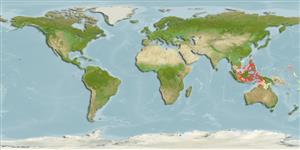Common names from other countries
>
Ovalentaria/misc (Various families in series Ovalentaria) >
Opistognathidae (Jawfishes)
Etymology: Opistognathus: Greek, opisthe = behind + Greek, gnathos = jaw (Ref. 45335); to the very elongate upper jaw of the type species of the genus, Opistognathus nigromarginatus (Ref. 128653); randalli: Named for Dr. John E. Randall..
Environment: milieu / climate zone / depth range / distribution range
Ekologi
marina; djupintervall 5 - 32 m (Ref. 81517). Tropical
Western Pacific: Indonesia, eastern Borneo and the Philippines.
Size / Vikt / Age
Maturity: Lm ? range ? - ? cm
Max length : 10.4 cm SL hane/ej könsbestämd; (Ref. 81517); 10.9 cm SL (female)
Short description
Bestämningsnycklar | Morfologi | Morfometri
Taggstrålar i ryggfenan (totalt) : 11; Mjukstrålar i ryggfenan (totalt) : 14 - 16; Taggstrålar i analfenan: 3; Mjukstrålar i analfenan: 14 - 15; Ryggkotor: 28. This species is distinguished by the following characters: elongate supramaxilla and posterior end of maxilla produced as a thin flexible lamina; a single conspicuous black stripe at inner lining of upper jaw and adjacent membranes; dorsal, anal and caudal fins with narrow, pale (blue in life) distal margins; when alive, dorsal portion of iris golden; lateral-line terminus below verticals between segmented dorsal-fin rays 1 to 4, typically below second to third ray; caudal vertebrae 18 (Ref. 81517).
Males of this species are strongly territorial and frequently engage in jaw locking combat, apparently to evict rivals or confiscate their burrows (Ref. 81517). Found in sand/rubble bottoms near reefs in about 5-30 m (Ref 90102).
Life cycle and mating behavior
Maturities | Reproduktion | Spawnings | Egg(s) | Fecundities | Larver
Smith-Vaniz, W.F., 2009. Three new species of Indo-Pacific jawfishes (Opistognathus: Opistognathidae), with the posterior end of the upper jaw produced as a thin flexible lamina. aqua, Int. J. Ichthyol. 15(2):69-108. (Ref. 81517)
IUCN Red List Status (Ref. 130435)
CITES (Ref. 128078)
Not Evaluated
Threat to humans
Harmless
Human uses
Verktyg
Special reports
Download XML
Internet-källor
Estimates based on models
Preferred temperature (Ref.
115969): 28.4 - 29.3, mean 28.8 (based on 778 cells).
Phylogenetic diversity index (Ref.
82804): PD
50 = 0.5000 [Uniqueness, from 0.5 = low to 2.0 = high].
Bayesian length-weight: a=0.00389 (0.00180 - 0.00842), b=3.12 (2.94 - 3.30), in cm Total Length, based on all LWR estimates for this body shape (Ref.
93245).
Trofisk nivå (Ref.
69278): 3.5 ±0.6 se; based on size and trophs of closest relatives
Fishing Vulnerability (Ref.
59153): Low vulnerability (10 of 100).
